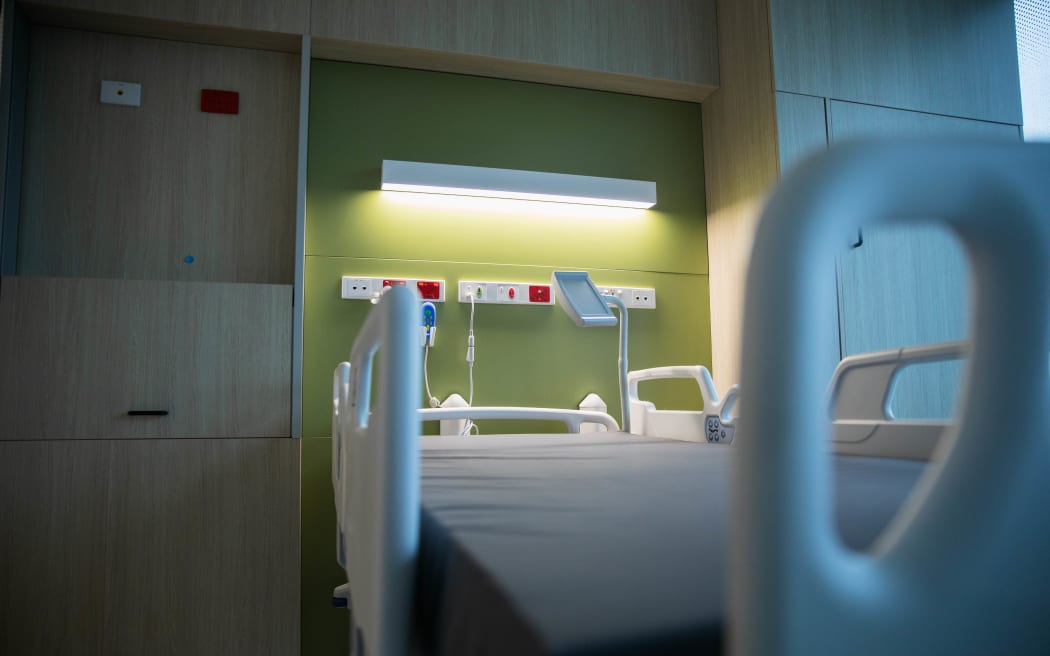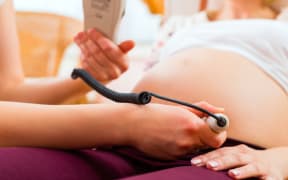
Photo: RNZ / Samuel Rillstone
Support for families whose babies die before or shortly after birth is patchy and fragmented, a report has found.
The Perinatal Bereavement Support Environmental Scan report, which has just been released by Te Whatu Ora, said services varied widely between regions, and most staff had no training on how to care for bereaved parents.
"Care often ends at the hospital doors, with limited post-care support provided," the report said.
Parents surveyed for the report described a sense of disconnect between themselves and hospital staff for whom it was "business as usual".
"We felt like we were going through an invisible experience."
Others described the process as being "too clinical" and there should have been more "compassionate communication" on delivering bad news.
Often parents only learned their baby had died from a sonographer, many of whom had not received any training on how to do this and / or in a culturally sensitive way.
Several parents who had lost more than one baby said there appeared little consideration of this history.
"It took us losing four babies for someone to care, before any intervention was offered to us, and it shouldn't be like that. We shouldn't have to go through all that before someone refers us to a specialist. We asked with our twins, and it felt like it fell on deaf ears."
Some whānau described it as "the most traumatising experience of their lives" because of the lack of information or support.
"If there was more support or care for me, then I think that I would have been able to have my pēpi with me. I didn't know what to ask or do."
Some whānau said the only support they received was in the form of brochures and pamphlets that were handed to them.
"It felt like - oh, your baby died, here you go, here is some information for you. But I just lost my baby, I'm not going to read that. At the time that everything is happening it all becomes a blur, no one is in their right state of mind."
Many women said being placed in the maternity ward after losing their babies was deeply traumatising.
"We heard babies crying and it made it really difficult for us."
Occasionally families felt their babies' remains should have been treated with more respect, with some describing seeing their dead child taken for a post-mortem in a kidney tray or dirty surgical cloth, or being given the body to take home in an envelope box.
"We went home to arrange the funeral, and came back with the casket supported by our whānau.
"There was no safe space for us to go to with the casket. We went to the main reception holding the casket and the process was not nice, there was no mana in their experience. We waited at the reception for a long time, there was no record of our pēpi, and no one was able to tell me where she was."
Some parents said staff were kind and "did the best that they could".
Parents also spoke positively about the services offered by non government organisations, such as Baby Loss NZ, Sands, and Little Miracles Trust.
"It is not surprising that these charities are so passionately driven by people who have, more often than not, themselves had an experience of perinatal bereavement. It is their compassion and their knowing, and their respect that strengthens the connections they have with the whānau they support," the report said.
The shortage of midwives generally meant a small number were often looking after a whole ward, resulting unlimited continuity of care and some women/people "feeling abandoned with the (perceived) focus being those women/people who had living pēpi".
Services and support varies
Services varied dramatically between regions, with only four or five perinatal loss hospital midwife specialists across the country - mainly in the main centres.
Within many hospitals, there confidence among staff that they could support bereaved whānau well, "but the structure of the organisation puts up too many barriers for them to provide it".
Bereaved parents at Counties Manukau are cared for by a Perinatal Loss Bereavement Team, including specialist midwives and social workers trained in grief counselling.
The hospital also provided bereaved parents with a pink slip so other staff were aware of the situation and could apply the appropriate processes and sensitivities to ensure a "gentle journey" through the hospital.
However, staff in Hauora a Toi / Bay of Plenty were struggling with such a lack of resources that some women were not consistently receiving any kind of prenatal care.
At Te Tai Tokerau / Northland, a bereavement room (the Butterfly Room) and pathways for bereaved whānau were set up in 2016, but services were described by the interviewees as "seriously understaffed".
At Waikato Hospital, care of miscarriages is now considered a "non-acute" service, which means women who used to be seen within 24 or 48 hours are now waiting five days for treatment.
Other examples cited include families who had suffered a miscarriage not being admitted past ED and "leaving the ED with their pēpi in a box and nothing else".
In one region, nurses were buying boxes to ensure whānau could take their pēpi home.
The report's recommendations include developing a national framework to set basic standards of care, bereavement training for all staff involved in perinatal care, and more government funding for organisations "so that they can continue the essential work they are doing to fill the gaps left by a lack of statutory services, instead of having to expend energy on fundraising".
Te Whatu Ora said the survey would help inform the development of a national Bereavement Care Pathway to give all families equitable, culturally responsive care in hospitals and the community.
The report was released along side the 2022 Maternity Consumer Survey, which found overall, 79 percent of mothers who had live births were satisfied with their care, although rates were lower for Māori (76 percent) and disabled people (62 percent).
Te Whatu Ora interim national chief midwife Deborah Pittam said the feedback from the women and their whānau to both surveys had been "invaluable" in guiding the decisions and improvements in the sector.
"I also want to acknowledge our incredible midwives and maternity kaimahi who delivered excellent health care for women and their whānau during what was - and continues to be - a very challenging time for the New Zealand health system. We thank them for their tireless work and commitment."
While satisfaction levels had dropped since the previous report in 2014, the overall results were positive, she said.
The fact the maternity survey was undertaken during the Covid-19 period "may have impacted satisfaction levels of women and whānau with the care they received during this time".
"We recognise how incredibly challenging it would have been for those giving birth or dealing with the loss of a baby to not have the usual supports wrapped around them."
As part of the Health Workforce Plan released earlier this year, Te Whatu Ora and the Māori Health Authority Te Aka Whai Ora were focused on growing the midwifery workforce including among Māori and Pacific people.


